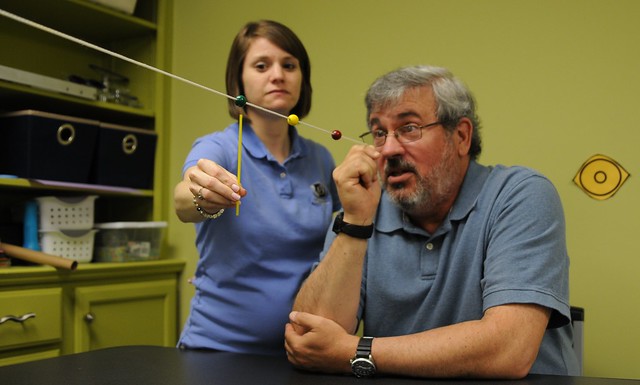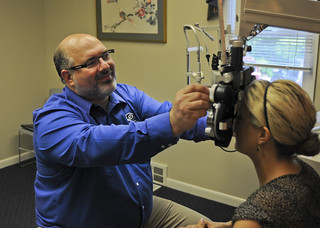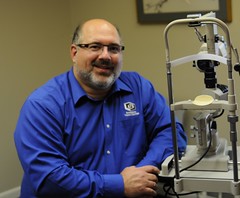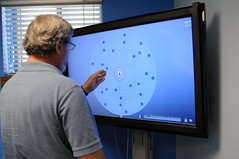Story and photos by Sgt. Cody Stagner, 133RD Mobile Public Affairs Detachment, Kentucky National Guard
[caption id="" align="aligncenter" width="576"]

Vision therapist Jessi Drawbaugh guides retired Col. Karlas Owens through a series of vision tests. Owens' vision problems are related to injuries he incurred during a tour of duty in Afghanistan. (Photo by Sgt. Cody Stagner, 133rd Mobile Public Affairs Detachment)
Click here for more photos.
SHELBYVILLE, Ky. -- Dan Bowersox, doctor of optometry and owner of Bowersox Vision Center in Shelbyville, Ky., now offers free vision therapy for Kentucky military veterans suffering from symptoms of traumatic brain injury.
According to the Department of Veterans Affairs, nearly 800 Kentucky troops had been diagnosed with TBI from 2007-2011.
[caption id="" align="alignleft" width="320"]

Dan Bowersox, doctor of optometry and owner of Bowersox Vision Center in Shelbyville, Ky., now offers free vision therapy for Kentucky military veterans suffering from symptoms of traumatic brain injury. (Photo by Sgt. Cody Stagner, 133rd Mobile Public Affairs Detachment)
A variety of eye problems can be traced to TBI, such as lazy eye, crossed eyes, double vision, blurred vision, light sensitivity, and reading and learning difficulties. For many veterans, neuro-optometric rehabilitation – better known as vision therapy – can address these symptoms directly and hopefully bring them back to normalcy.
“In my opinion, TBI is often under diagnosed and goes untreated,” commented Bowersox. “The ability to work depends on the ability to see. With this program, our goal is to improve our veterans’ quality of life, so they can return to work and to their daily lives.”
Bowersox designed his vision therapy treatment outcomes for three types of patients: small children, athletes, and those suffering from TBI. As he describes it, small children learn visual and memory skills and often notice better grades in school; athletes in sports vision therapy can benefit from enhanced performance; and TBI patients’ success stories involve the remarkable return to their normal daily lives.
“A couple months ago, I came in for a regular eye check-up when Dr. Bowersox recommended me for his program,” said Karlas Owens, retired colonel from the Kentucky Army National Guard, 238
th Training Regiment. “It was kind of funny – it was like he knew every problem I was having and I didn’t even say them out loud.”
Owens retired after 34 years of service and was injured in 2003 while on tour in Afghanistan with the U.S. Army 10
th Mountain Division.
“I struggled with memory lapse, reading comprehension, and headaches, mostly,” said Owens. “It was even hard for me to go into bright stores [like Wal-Mart] without feeling uncomfortable.”
“My wife was the first to notice the changes after about six weeks,” Owens said. “I used to forget some of the smallest things, like remembering why it was I walked into the other room. I would walk back and forth two or three times trying to remember. The memory exercises help a lot.”
[caption id="" align="alignright" width="240"]

Dan Bowersox, doctor of optometry and owner of Bowersox Vision Center in Shelbyville, Ky., now offers free vision therapy for Kentucky military veterans suffering from symptoms of traumatic brain injury. (Photo by Sgt. Cody Stagner, 133rd Mobile Public Affairs Detachment
Some common tools found in a typical vision therapy session might range from simple reading to challenging memory games, or from basic spatial awareness activities to using 3-D glasses, computers, and a space fixator. All tools work to address differently attained skills but share one thing in common: they train – or retrain – the eyes and mind to focus on working together.
When asked what the most noticeable changes are in their patients at Bowersox Vision Center, Jessi Drawbaugh, vision therapist from Pleasureville, Ky., said, “I’ve seen the largest improvement in the social interaction and confidence of our patients. You can tell just by the way they look when they walk in and their attitudes when they leave.”
Symptoms of TBI and post-traumatic stress are often a topic of controversy in military journalism as they share many characteristics. Both Drawbaugh and Bowersox agreed in all cases they found increased self-esteem a positive side effect. Bowersox also believes – with as many shared symptoms – therapy treatment methods for TBI "is a good thing to do if someone has PTSD, because I feel it can decrease anxiety and frustration with life."
Bowersox has worked with several veterans in the past and all have had positive experiences. He and his staff offer a welcome and friendly environment.
[caption id="" align="alignleft" width="240"]

Retired Col. Karlas Owens goes through a series of vision tests. Owens' vision problems are related to injuries he incurred during a tour of duty in Afghanistan. (Photo by Sgt. Cody Stagner, 133rd Mobile Public Affairs Detachment)
“There has to be more health professionals out there taking lead as part of the solution," he said. "Rather than worrying about how to pay for treatment, we keep it simple; it’s a free service with no strings attached.”
"I have always wanted to work with the military. Now is my chance to give back and show thanks. Rather than worrying about how to pay for treatment, we keep it simple; it's a free service with no strings attached."
Find Bowersox Vision Center on Facebook or visit their website at
www.drbowersox.com. Information on the Veterans Vision Therapy program is not listed so please call (502) 647-3937 for details and to schedule an appointment.